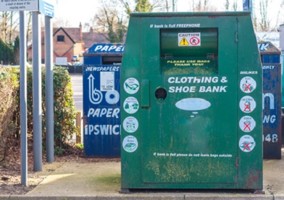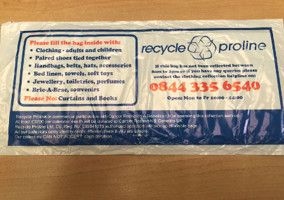Two charities have breached the Code of Fundraising Practice over complaints about charity bags collections, the Fundraising Regulator has found.
The regulator has today published the summaries of three complaints investigations.
Cancer charities Breast Cancer Research Aid and Cancer Research and Genetics UK were both found in breach of the code after someone complained about receiving unwanted charity bags from them. Cancer Research and Genetics UK also refused to engage with the regulator.
Mermaids, a charity supporting gender-diverse young people and their families, was investigated over a fundraising advert on YouTube but the regulator found no breaches of the fundraising code.
Charity ‘not engaging’ with the Fundraising Regulator
Cancer Research and Genetics UK was found in breach of the code after its agency, Recycle Proline Ltd, repeatedly delivered a charity bag to a “restricted” address.
The agency apologised to the person who complained and engaged with the regulator, which found it in breach of the code because it “engaged in unreasonably persistent fundraising” and did not handle the complaint properly.
However, the regulator could not properly investigate the charity and how it monitors agencies carrying out collections for it as the charity refused to engage with the regulator.
The investigation summary says: “The charity did not engage with our investigation, which we are concerned about. We were therefore unable to make any findings in relation to the charity’s oversight of the agency’s fundraising on its behalf.
“We will be providing a copy of our final decision to the Charity Commission for England and Wales on the grounds that not cooperating with the regulator represents wider governance concerns.”
Cancer Research and Genetics UK was founded by Nick Philips, who lost his wife to cancer at the age of 45 and is a cancer patient himself. Philips said that the charity does not engage with the Fundraising Regulator because he believes the way it operates is unfair.
Philips said: “We don’t engage with the Fundraising Regulator because we believe its decision making its unfair, and too in favour of the general public.
“With the amount of collections we do, it’s unfair to be focusing so much on a few complaints, especially during a pandemic that has put a lot of pressure on charities.
“It’s unbalanced to focus so much on a small number of complaints, as opposed to the benefits of our work, which include recycling clothes that would otherwise go to the landfill, thus helping the environment, as well as of course raising money for cancer research.
“We also disagree with implicating wider governance issues at our charity and reporting the same to the Charity Commission to escalate even further. That is not the case and it is unfair of the Fundraising Regulator to imply so simply because we do not engage with it.”
Philips had expressed concerns over the Fundraising Regulator in the past, accusing it of “threatening” its charity and “bullying” him.
Cancer Research and Genetics UK had an income of £57,000 in 2019 and it is not registered with the Fundraising Regulator.
A spokesperson for the Fundraising Regulator said: “The Fundraising Regulator’s complaints process is an essential backstop for members of the public who wish to raise concerns about a charity’s fundraising practice. Our process helps ensure that donors are protected and high standards of fundraising are maintained. This in turn keeps trust in charity fundraising high and gives the public confidence to donate.”
Breast Cancer Research Aid
Breast Cancer Research Aid and its agency Giving Support Ltd were also investigated over the delivery of a charity bag to an unrestricted address.
There wasn’t enough evidence to conclude whether this actually happened, but the regulator found that both the agency and the charity breached the code. Neither handled and investigated the complaint properly, and the charity also failed to monitor the agency adequately.
The regulator recommended that they both improve their complaints handling procedures, and that the charity monitors the agency more adequately. Both accepted the findings, the regulator said.
Mermaids
Finally, Mermaids was investigated after someone complained that an eight-year-old saw a fundraising video for the charity on YouTube, while watching an age-appropriate video.
However, the Fundraising Regulator found that the charity had not intentionally targeted the video to children, had not put unreasonable pressure on the viewer to donate, and had adequately dealt with the complaint.
It concluded that there was no breach of the code in this case.
Editor's note - 13.18
This article has been updated to include comment from the Fundraising Regulator
Related articles












